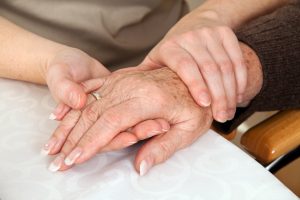Sage Advice
By Iris Winston
A personal decision that takes courage
When a friend asks for help, you give it. That’s what friends do. So, when my good friend called to say she needed a favour, I wondered why she added, “but don’t feel you have to, if you don’t believe it’s the right thing to do.”

The request that she was making, on behalf of her husband, was to witness his signature as he completed the MAID (medical assistance in dying form) — basically a permission slip for physicians to end his life — and confirm that he was clear in his intent and signed the document
willingly.
There was never any question that I would do what they asked. They needed me. End of story. This couple had been among my very closest friends for more than 30 years. Over the last few, they had suffered and survived his massive health problems, but now he wanted insurance, as he put it, in case he could continue the fight no longer. But, he checked, as his wife had checked in her initial call, that I was comfortable with being involved.
My feelings about MAID — and I really had none at that moment on the ethics or religious front — were irrelevant. I unquestionably hated
the thought of losing him, but his request was simple enough. All he needed from me was to witness his signature and sign that he understood the action he was taking. He was clear that this was a backburner move for now, although he said he was not optimistic about being able to overcome his most recent and devastating health challenge.
Once a public figure, a major player on many stages, he had been so full of energy and enjoyment of every aspect of life for so long. He loved to travel, visit new cultures, add new experiences of all kinds, embrace a wide circle of friends and entertain lavishly. He was proud of his family, kind to all those around him and deeply committed to his faith.
The downward swing of his health began after a leisure cruise, when he started showing symptoms of heart disease. (Strangely, five acquaintances of mine had taken a vacation with the same cruise line on the same route at various times and had suffered from some degree of heart issues sooner or later after their trips. Perhaps, it was just coincidence, but I have always wondered.)
In any case, my friend’s cardiomyopathy was soon severe enough that he and the family were warned that death could be imminent and he was told to put his affairs in order. They lived with this knowledge and increasingly frequent medical treatments for close to 13 years. The unhappy phone call telling me about the physician’s prognosis, remains as vivid in my memory as the contrastingly wonderful moment one Christmas Day, when he raised a toast to my son’s then fiancé and her twin sister welcoming them to our “extended family.” And it has certainly felt as though we are part of an extended family all these years.
Eventually, following a major infection and a subsequent medical crisis, he seemed to be nearing the end of his life. Somehow, he survived and recovered sufficiently during a lengthy stay in hospital to be able to withstand the major surgery he required. I always thought that a combination of willpower, positive thinking and his determination to live as normal a life as possible kept him going—just as much as the support of his family and the medical care he received.
Because his own heart was functioning at little more than 10 per cent of capacity, his only options were a heart transplant, or a left ventricle assist device (LVAD) before he could be discharged from hospital. He survived the complex open-heart surgery and lived with the LVAD — and the difficulties and worry of hanging onto life through a piece of external machinery — for several months before he was deemed well enough to be added to the heart transplant list.
This time, he was one of the lucky ones and was a match for an available heart fairly soon afterwards. Then came the good years, more than six of them. He seemed healthy, happy, his old energetic, humorous self. We all knew that he would have to take immunosuppressants to prevent the rejection of the donor heart, as well as various other drugs, for the rest of his life, but death was no longer the heavy and immediate shadow that it had been for close to two decades.
However, one of the many possible side effects of the immunosuppressants is cancer, because the body’s immune system is no longer able to fight at full strength. After six years, a growth appeared inside his cheek, at first an annoyance. Then as it swelled, it became very sensitive and turned into an extremely painful interference with his daily existence. We all tried to believe it was a minor problem. He checked
assorted medical books and decided that it was a life threatening tumor. It was some months before he was sadly proved right, because it seemed to take an inordinately long time before he was able to see a cancer specialist. By the time the surgeon called for biopsies and other tests to diagnose the now much larger growth, determine its malignancy, and arrange for radiation and chemotherapy, even some of the lab technicians conducting the tests queried why it had taken so long to begin treatment.
The next year was horribly difficult for him — and for his wife too, as she was always at his side — as the multitude of painful treatments and seemingly constant medical appointments crowded into their days. Radiation burns in his mouth and throat made it increasingly difficult for him to eat. In any case, he had lost interest in most food and the few liquids he could manage to consume. His weight dropped sharply. He
became weaker and weaker. The growth did not shrink under treatment though we all — except for him — tried to believe that it had. Would things have been better if he had been able to see the oncologist sooner? Although that is impossible to answer, there is a nagging feeling that perhaps, even if a cure was not in the cards, his suffering might have been lessened.
As it was, he was told the cancer had spread to other organs and his options were very limited. He had little time left and, even with more of the extremely painful treatment, he might add only a few weeks or months at best. Through it all, he had grown so weak, losing strength almost by the day. Although he saw little point in continuing, he did take one more set of radiation, but to no avail. There was one more emergency trip to hospital, resulting in a new infection that left him even more infirm and with even less hope. After that, as he said, “they sent me home to die. ”Now undergoing palliative care, he was visited regularly by nurses, a physician and other medical professionals. But the pain increased and his weakness made it hard for him even to leave his bed unaided. He considered what lay before him and what he should do.
Possibilities, instead of just waiting for life to seep away through continuing extensive pain and growing inability to function even minimally, included palliative sedation (sometimes called terminal sedation). Not waking into another day of “this existence that is not living,” as he said, would certainly end his suffering, but would it extend the emotional pain for his family?
Bill C14, the federal legislation to regulate medical assistance in dying had come into effect on June 17,2016.He had already arranged for me
and another friend to witness his signing the MAID papers while he was still comparatively healthy. Then, it had been a just in-case move. Now, he was coming to terms with how any form of hastening his impending death might conflict with his religious beliefs. He talked to his pastor, and asked me to contact another minister for the views of a different church.
The answer I received was “as long as all the rules are followed. ”And they were extensive. Perhaps this is why there is now some discussion about simplifying the MAID regulations. As the rules stood for him, they having an incurable illness and being in an “advanced state of irreversible decline. ”He also needed to have signed the papers voluntarily at an earlier time — as he had done — while he was fully capable of
making the decision. Then he had to consent a second time, three days before the chosen time and, after the required reflection period, confirm that decision immediately before the MAID team administered the final injection that would end his life.
The process is deliberately carefully paced to give patients time to reconsider and, should a miracle occur, to give any indication of health improvement that might lead to a change of mind. My friend did not make his decision lightly. He had lived under threat of death and won for many years. He knew that he was looking at a future of a few days or weeks of increasing pain and growing incapacity and simply could not face such an existence. He chose ,instead, to take control, to say goodbye to all his loved ones in his time and in his own way. For example, he completed a circle by ending his life on the anniversary of his marriage of 52 years. He gave each of his close friends a gift to remember him by a few weeks beforehand. The ring he gave me will be one of my most treasured possessions for the rest of my life.
Of course, we all miss him terribly. How could you not miss someone so warm with such a larger-than-life personality and so much courage? But neither can I begrudge him the right to employ MAID and take the opportunity to live his last moments in control and surrounded by the family he loved with all his heart.
Would I use MAID? I have no idea. At this moment, I don’t think so, but then I am not in constant pain. The radiation treatment I received for two bouts of breast cancer was not particularly harsh and, at this time, appears to have been entirely successful. I didn’t have to walk in his shoes and suffer so horribly. I have used the MAID equivalent for the dogs and cats I have loved over the years when euthanasia seemed the kindest option for a terminally sick animal in pain and with no hope of recovery.
I have often said that we should be as kind to dying people as we are to terminally sick pets. But when I am face to face with my own death, will I feel the same way? I just don’t know. I just hope that I will be able to cope with the final question with as much courage and elegance as my good friend.
MAID Expanded
Following closure of debate in the House of Commons on March 11, MAID legislation is closer to expansion. The requirement for death to be “reasonably foreseeable” was ruled unconstitutional by Quebec Superior Court in 2019.The ruling stated that a person in extreme suffering and with no prospect of that suffering ending should have a similar right to choose MAID as a person facing imminent death. The court gave Parliament a year to amend the legislation. After four extensions, the deadline would have been March 26. The removal of the reasonably foreseeable death provision opened the way for the inclusion of mental illness in MAID. This and the question of whether mature minors
should also be eligible for MAID will be studied by an expert medical panel (yet to be struck) for the next two years.






